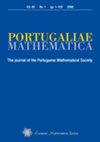热带哈塞特空间的自同构
IF 0.8
4区 数学
Q3 MATHEMATICS
引用次数: 1
摘要
给定一个整数$g \geq 0$和一个满足$2g - 2 + \sum w_i>0$的权向量$w \in \mathbb{Q}^n \cap (0, 1]^n$,令$\Delta_{g, w}$表示$n$标记的、$w$稳定的$g$属热带曲线和卷1的模空间。我们计算了$g \geq 1$和任意$w$的自同构群$\mathrm{Aut}(\Delta_{g, w})$,当$w$是重/轻时,我们计算了$\mathrm{Aut}(\Delta_{0, w})$。在这两种情况下,我们都证明了$\mathrm{Aut}(\Delta_{g, w}) \cong \mathrm{Aut}(K_w)$,其中$K_w$是$\{1, \ldots, n\}$上的抽象简单复合体,其面是$w$ -权值最多为$1$的子集。我们证明了这些群正是对称群的有限直积。空间$\Delta_{g, w}$也可以看作是代数哈塞特空间$\overline{\mathcal{M}}_{g, w}$中奇异曲线的因子的对偶复形。继Massarenti和Mella对双正则自同构群$\mathrm{Aut}(\overline{\mathcal{M}}_{g, w})$的研究之后,我们证明了$\mathrm{Aut}(\Delta_{g, w})$是保留奇异曲线的因子的自同构子群。本文章由计算机程序翻译,如有差异,请以英文原文为准。
Automorphisms of tropical Hassett spaces
Given an integer $g \geq 0$ and a weight vector $w \in \mathbb{Q}^n \cap (0, 1]^n$ satisfying $2g - 2 + \sum w_i>0$, let $\Delta_{g, w}$ denote the moduli space of $n$-marked, $w$-stable tropical curves of genus $g$ and volume one. We calculate the automorphism group $\mathrm{Aut}(\Delta_{g, w})$ for $g \geq 1$ and arbitrary $w$, and we calculate the group $\mathrm{Aut}(\Delta_{0, w})$ when $w$ is heavy/light. In both of these cases, we show that $\mathrm{Aut}(\Delta_{g, w}) \cong \mathrm{Aut}(K_w)$, where $K_w$ is the abstract simplicial complex on $\{1, \ldots, n\}$ whose faces are subsets with $w$-weight at most $1$. We show that these groups are precisely the finite direct products of symmetric groups. The space $\Delta_{g, w}$ may also be identified with the dual complex of the divisor of singular curves in the algebraic Hassett space $\overline{\mathcal{M}}_{g, w}$. Following the work of Massarenti and Mella on the biregular automorphism group $\mathrm{Aut}(\overline{\mathcal{M}}_{g, w})$, we show that $\mathrm{Aut}(\Delta_{g, w})$ is naturally identified with the subgroup of automorphisms which preserve the divisor of singular curves.
求助全文
通过发布文献求助,成功后即可免费获取论文全文。
去求助
来源期刊

Portugaliae Mathematica
MATHEMATICS, APPLIED-MATHEMATICS
CiteScore
0.90
自引率
12.50%
发文量
23
审稿时长
>12 weeks
期刊介绍:
Since its foundation in 1937, Portugaliae Mathematica has aimed at publishing high-level research articles in all branches of mathematics. With great efforts by its founders, the journal was able to publish articles by some of the best mathematicians of the time. In 2001 a New Series of Portugaliae Mathematica was started, reaffirming the purpose of maintaining a high-level research journal in mathematics with a wide range scope.
 求助内容:
求助内容: 应助结果提醒方式:
应助结果提醒方式:


